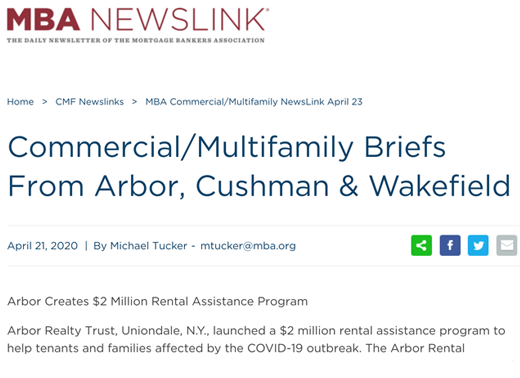Commercial/Multifamily Briefs From Arbor, Cushman & Wakefield
Eastern Union Offering 20 Paid Internships in Data Analytics, Research; Zoom Information Session June 7
Eastern Union, New York, is offering paid internships in data analytics and research, one of the most in-demand skills in today’s business marketplace.
Under the hands-on tutelage of company president and co-founder Ira Zlotowitz and the company’s team of data researchers, 20 paid interns will take part in a 36-hour remote training course in data analytics. The company will then hire at least one graduating intern on a full-time basis, in addition to up to fifteen on a commission basis.
The worldwide data analytics marketplace is on pace to nearly triple by 2027, a March 2020 report from ResearchAndMarkets.com found. The analysis found that demand, which stood at $37.34 billion in 2018, would increase by 281 percent to $105.08 billion within nine years.
The growth of the big data analytics research market is being driven by “the rapidly increasing volume and complexity of data…due to growing mobile data traffic, cloud-computing traffic, and burgeoning development and adoption of technologies including IoT [the internet of things] and AI [artificial intelligence],” ResearchAndMarkets.com said.
Businesses use data analytics to think more strategically — and to analyze and solve a wide spectrum of business problems. There are four primary types of data analytics: descriptive, diagnostic, predictive and prescriptive analytics.
The 36-hour remote internship program begins on Monday, June 14. Eastern Union is hosting an obligation-free “open house” via Zoom on Monday, June 7 from 12:00-12:30 PM ET.
For more information about the paid internship initiative, visit this link. This opportunity is open to all U.S. citizens.
CREtelligent Launches Automated Valuation Model for Commercial Properties
CREtelligent.com and Black Knight subsidiary Collateral Analytics launched a Commercial Automated Valuation Model.
CREtelligent said it can now deliver an estimated property value to a commercial real estate professional in less than 30 seconds.
“In the business of commercial real estate, knowing the value of your assets at any point in time gives you an advantage and can be instrumental in managing risk and maximizing returns,” said Anthony Romano, CEO of CREtelligent. “In some situations, speed is important, and the time and cost of a full appraisal is not an option.”
Romano noted the CAVM is not Uniform Standards of Professional Appraisal Practice-compliant or intended to replace an appraisal but can be used to make or support value assumptions. Automated valuation models have been used for decades in the residential market and have grown in popularity in commercial market in recent years.
The CREtelligent CAVM provides an instant estimated property value or probable price and includes comparables used with low, high, mean and median ranges. Property information includes loan, tax, sales history, market statistics, rental prices, net operating incomes, rent rolls and more. A CAVM can be generated for a single property or a portfolio and can be used on any property type: multifamily, industrial, retail or office.
Romano said the company plans to further its offerings in the valuation space, noting that commercial evaluations and broker price opinions are valuation reports the company currently provides on its RADIUS platform.
REIT Earnings Recovery Slows in First Quarter
After two consecutive quarters of double-digit growth, real estate investment trust earnings recovery slowed in the first quarter of 2021.
The Nareit Total REIT Industry Tracker Series report found funds from operations for all equity REITS rose 2.0 percent to $14.0 billion.
“Different parts of the economy are reopening at different speeds, and REIT performance by property sector reflects this variation,” said Calvin Schnure, Nareit Senior Economist. “The recovery is broadening with the vaccine rollout, however, and prospects for improvement have gone from ‘if’ to ‘when’.”
FFO for industrial REITs rose 15.7 percent to $1.5 billion, a record high. The retail sector–one of the sectors hardest hit by the pandemic–reported a 5.5 percent rise in FFO, and has recovered more than a third of the decline in FFO that occurred during the 2020 spring economic shutdowns.
Regional malls saw the greatest increase in FFO, up 14.5 percent, Nareit reported. FFO for shopping centers rose 7.8 percent while FFO for free-standing retail fell 9.9 percent. The office sector showed continued declines in the first quarter while lodging/resorts reported negative FFO for the fourth consecutive quarter.






